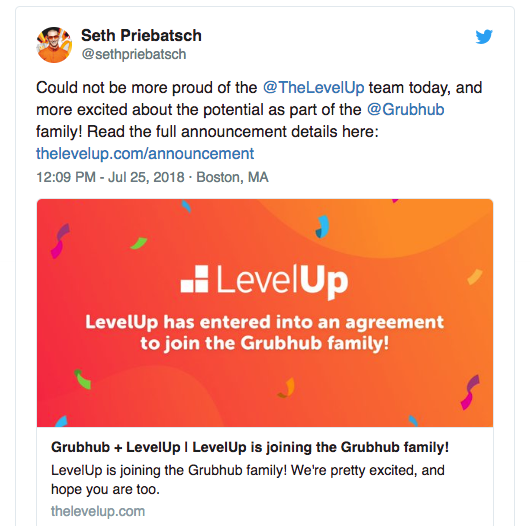Grubhub Acquires Dreamit Alum LevelUp for $390M
Dreamit portfolio company LevelUp was acquired by Grubhub in a “spectacular outcome” for the accelerator and venture fund.
Founder and CEO Matt Maloney told TechCrunch that while previous Grubhub acquisitions like Eat24 were designed to give the company’s delivery business more scale, “This is kind of a different acquisition. It’s a product and strategic positioning acquisition.”
LevelUp is based in Boston and offers a platform to manage digital ordering, payments and loyalty, with customers like KFC, Taco Bell Pret a Manger, Potbelly and Bareburger. Maloney said that buying the company allows Grubhub to deepen its integration with restaurants’ point-of-sale systems. That, in turn, will allow them to handle more deliveries.
Technically Philly recollects LevelUp's time at Dreamit with Dreamit founder Steve Welch. He still remembers getting LevelUp’sapplication to the inaugural cohort of the DreamIt Ventures accelerator, way back in 2008 when the digital payments, ordering and loyalty company went by SCVNGR and focused on interactive mobile gaming.
SCVNGR (later renamed LevelUp) presents at the first Dreamit Ventures demo day.
“The application came in at 11:59 p.m. on the day it was due,” Welch told Technical.ly. “They came in the program when Seth [Priebatsch, CEO and cofounder] was just 17. He was an exceptional individual from the start.”
Fast forward to July 2018, and the Dreamit portfolio company, which relocated to Boston after the cohort, announced its acquisition by Chicago-based Grubhub for $390 million, in a move that Welch said was telling of the founding team’s strength.
“People always talk about overnight successes,” said Welch, who relocated to Austin, Texas, in 2013 and founded cryogenics startups Restore Cryotherapy. “But they came to Dreamit now 3,718 days ago.” Welch declined to disclose specific financial terms from the deal citing financial regulations as Dreamit is currently raising a fund. The accelerator, until 2016, took 6 percent equity in companies in exchange for a $25,000 investment and access to its programming and mentoring.
“What I can say is that this was a spectacular outcome for all parties involved,” Welch said.
Before the acquisition, LevelUp had raised $85 million in venture capital, including a $50 million round from JPMorgan Chase, according to CNBC.
The founder of Level broke the news to his followers on Twitter after the announcemnent was made public.
Founder Matt Maloney states that LevelUp can help Grubhub build a restaurant platform that goes beyond delivery, for example by managing their customer interactions across mobile and the web.“We want to help restaurants actively engage with their diners,” Maloney said. “This is a huge step in that direction.”
Once the regulatory waiting period is over, the entire LevelUp team will be joining Grubhub, with founder and CEO Seth Priebatsch reporting to Maloney — who said that in the short term, he plans to change very little, aside from the POS integrations. Even in the long term, he suggested that LevelUp could continue to operate as its own brand within the larger Grubhub platform.
“They’re doing something really well and we don’t want to screw that up,” he said. “We want to make as little change as possible, until we all understand how we’re better working together.”
The LevelUp platform was launched in 2011, and the company has raised around $108 million in total funding. Investors include Highland Capital, GV, Balderton Capital, Deutsche Telecom Strategic Investments, Continental Advisors, Transmedia Capital and U.S. Boston Capital.
“For the last seven years, we have worked to provide restaurant clients with a complete solution to engage customers, and this agreement is the biggest and most exciting step in achieving that mission,” Priebatsch said in a statement. “After close, the entire team will remain in Boston and our office will become Grubhub’s newest center of technology excellence.”

